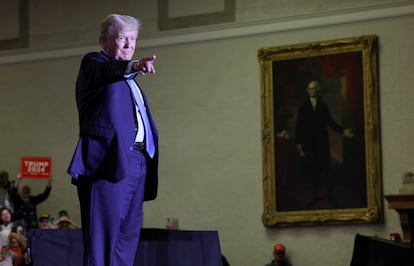Supreme Court will hear a case that could undo Capitol riot charge against hundreds, including Trump
The court’s decision to weigh in on the obstruction charge could threaten the start of Trump’s trial, currently scheduled for March 4

The Supreme Court on Wednesday said it will hear an appeal that could upend hundreds of charges stemming from the Capitol riot, including against former President Donald Trump.
The justices will review an appellate ruling that revived a charge against three defendants accused of obstruction of an official proceeding. The charge refers to the disruption of Congress’ certification of Joe Biden’s 2020 presidential election victory over Trump.
That’s among four counts brought against Trump in special counsel Jack Smith’s case that accuses the 2024 Republican presidential primary front-runner of conspiring to overturn the results of his election loss. Trump is also charged with conspiracy to obstruct an official proceeding.
The court’s decision to weigh in on the obstruction charge could threaten the start of Trump’s trial, currently scheduled for March 4. The justices separately are considering whether to rule quickly on Trump’s claim that he can’t be prosecuted for actions taken within his role as president. A federal judge already has rejected that argument.
The Supreme Court will hear arguments in March or April, with a decision expected by early summer.
The obstruction charge, which carries up to 20 years behind bars, has been brought against more than 300 defendants and is among the most widely used felony charges brought in the massive federal prosecution following the deadly insurrection on Jan. 6, 2021, when a mob of Trump supporters stormed the Capitol in a bid to keep Biden, a Democrat, from taking the White House.
At least 152 people have been convicted at trial or pleaded guilty to obstructing an official proceeding, and at least 108 of them have been sentenced, according to an Associated Press review of court records.
A lower court judge had dismissed the charge against Joseph Fischer, a former Boston police officer, and two other defendants, ruling it didn’t cover their conduct. The justices agreed to hear the appeal filed by lawyers for Fischer, who is facing a seven-count indictment for his actions on Jan. 6, including the obstruction charge.
The other defendants are Edward Jacob Lang, of New York’s Hudson Valley, and Garret Miller, who has since pleaded guilty to other charges and was sentenced to 38 months in prison. Miller, who’s from the Dallas area, could still face prosecution on the obstruction charge.
U.S. District Judge Carl Nichols found that prosecutors stretched the law beyond its scope to inappropriately apply it in these cases. Nichols ruled that a defendant must have taken “some action with respect to a document, record or other object” to obstruct an official proceeding under the law.
The Justice Department challenged that ruling, and the appeals court in Washington agreed with prosecutors in April that Nichols’ interpretation of the law was too limited.
Other defendants, including Trump, are separately challenging the use of the charge.
More than 1,200 people have been charged with federal crimes stemming from the riot, and more than 700 defendants have pleaded guilty.
Sign up for our weekly newsletter to get more English-language news coverage from EL PAÍS USA Edition
Tu suscripción se está usando en otro dispositivo
¿Quieres añadir otro usuario a tu suscripción?
Si continúas leyendo en este dispositivo, no se podrá leer en el otro.
FlechaTu suscripción se está usando en otro dispositivo y solo puedes acceder a EL PAÍS desde un dispositivo a la vez.
Si quieres compartir tu cuenta, cambia tu suscripción a la modalidad Premium, así podrás añadir otro usuario. Cada uno accederá con su propia cuenta de email, lo que os permitirá personalizar vuestra experiencia en EL PAÍS.
¿Tienes una suscripción de empresa? Accede aquí para contratar más cuentas.
En el caso de no saber quién está usando tu cuenta, te recomendamos cambiar tu contraseña aquí.
Si decides continuar compartiendo tu cuenta, este mensaje se mostrará en tu dispositivo y en el de la otra persona que está usando tu cuenta de forma indefinida, afectando a tu experiencia de lectura. Puedes consultar aquí los términos y condiciones de la suscripción digital.








































